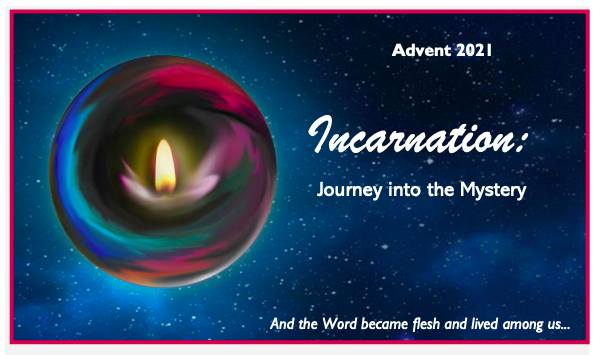
Think of us in this way, as servants of Christ and stewards of God’s mysteries. 1 Corinthians 4:1
Wow! Did Advent sneak up on us this year or what? We’re still thinking about everything else that’s been happening this fall, like how we’ve reopened to in-person and hybrid gatherings and how our work is unfolding in some new and different ways as a result of the pandemic. But, here we are, entering the season of Advent, the season of waiting and preparation for the revelation of God’s good news. Only, we aren’t waiting as if Christmas hasn’t come yet. We are waiting as if there is more to discover about what we mean when we say that God became one of us. We are entering in new ways into the mysteries of God’s ways in the world.
The big church word for God becoming one of us is Incarnation. We use this word in worship and liturgy regularly, and especially during Advent and Christmas, but do we know what it means? In one of our Bible study groups recently, someone asked what incarnation means and people were hard pressed to give an answer. Incarnation seems difficult to define, describe or explain.
Throughout the centuries, the church has given us help in how to think about incarnation theologically, but often from the standpoint of a dogmatic position to hold or as a way to look back at the life of Jesus in historical terms. The trouble with both of those ideas is that they don’t really help us live our lives and faith now or shape how we follow the ways of Jesus and view the world into which he came. They make the Incarnation a past event rather than a way of life, something to be understood rather than a mystery in which we live.
So, Tami and I would like to invite you into the mystery of Incarnation. Not simply what happened or how, but what it means to live in this mystery of God becoming one of us, God living among us, God revealing Godself to us in the form of one of us. We don’t want to simply think about the past. We want to learn how we are to be stewards of the mysteries of God now. How does the story of God becoming one of us invite us to live in it rather than simply explain it? How does incarnation change the way we think about ourselves, one another, our ministry, and our world?
Paul wanted the Christians in Corinth to think differently about the incarnation and their lives and ministry also. Before the verse above, he addressed our “human inclination,” as he described it, to play favorites and give our allegiance to certain church leaders over others. Paul reminded them that before they belong to any group or ideology, they “are God’s temple and that God’s Spirit dwells in you.” Paul asserts that his primary job, the most important job any leader in the church has, the first priority of Tami, me, the elders and deacons, and Sunday school teachers, our number one job is to help people understand that God didn’t simply dwell in people in the past, but continues to dwell in all of us right here and now.
Our work is to help people understand how God’s incarnation in Jesus helps us understand God’s incarnation in each of us and in our life together and in the world everywhere around us. The mysteries of that are far greater than we can ever fully grasp and the possibilities of experiencing God and hearing God’s voice in this life are far more numerous than we are aware. We are called to learn and grow and live in this mystery and even to steward it, to take care of it and share it, so that God’s good news of love and grace may be heard and experienced in every corner of this world God loves.
Join us this Advent and Christmas season as we journey into the mystery of the Incarnation and discover anew the wonder, the peace, the presence of God within us, among us, and all around us.
~Chip
